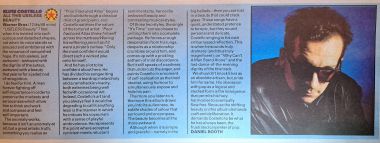Melody Maker, May 18, 1996: Difference between revisions
(formatting) |
(standardize image size) |
||
| (3 intermediate revisions by 2 users not shown) | |||
| Line 4: | Line 4: | ||
{{Bibliography article header}} | {{Bibliography article header}} | ||
<center><h3> All This Useless Beauty </h3></center> | <center><h3> All This Useless Beauty </h3></center> | ||
<center>''' Elvis Costello | <center>''' Elvis Costello </center> | ||
---- | ---- | ||
<center> Daniel Booth </center> | <center> Daniel Booth </center> | ||
---- | ---- | ||
{{ | {{Bibliography text}} | ||
{{ | "Useless Beauty"? Not when it is twisted into such curious and detached shapes, not when its voice stands so amused and embittered with the romance of vanquished hope. It's not useless, just awkward — awkward with the dignity of the auteur, awkward with a beauty that yearns for a jaded nod of recognition. | ||
I do feel for him. A man forever fighting off self-importance in order to preserve the modesty and seriousness which allow him to think and work and compose and feel self-important. | |||
The anomaly works, because it isn't an anomaly at all, but a great artistic truth; something you realise as "Poor Fractured Atlas" begins and builds through a classical mist of grand piano, and Costello satirises the nature of the tortured artist: ''"Poor fractured Atlas threw himself across the mattress / Waving his withering pencil as if it were a pirate's cutlass."'' Only the most confident would direct such a wicked joke onto himself. | |||
And he has a lot to be confident about here. He has divided his songwriting between a teardrop melancholy and a ramshackle vivacity, both extremes being well fed with occasional wit. Indeed, Costello's art (and you always feel it would be degrading to call it anything less) is the manner in which he imbues his voyeurism with a sense of playful ambivalence. He represents the point where accepted cynicism meets reluctant sentimentality, hence the awkward beauty and contrasting musical styles. | |||
Of those two styles, the single "It's Time" comes closest to uniting them into a complete package. He forces a rough desperation from his lungs, despairs as a relationship crumbles around him, and comes up with a prickling anthem of mild discordance. But it still speaks of a sadness that undercuts the anger, and paints Costello in a moment of self-realisation as the tired idealist, using humour to simultaneously expose and hide his pain. | |||
The more you listen to it, the more this album draws you into its sullenness, its subtle shades of colour that surround and encompass. The beauty becomes all the more awkward. | |||
Although when it is simple and graceful-namely in the big ballads — then you are lost in a beauty that could crack glass. These songs have a quiet, understated pretence to be epic, but they sound personal and delicate, Costello singing to his own embarrassed reflection. This is when he sounds truly dramatic (and thus truly magnificent), on "Why Can't A Man Stand Alone" and the last-dance-of-the-evening dignity of the title track. | |||
We shouldn't knock Elvis as an obsolete artisan, but ''pride'' him for same. His obsession with pop as a logical and studied form is the indulgence that permits his hazy harmonies to eventually flow free. Because the shifting beauty on this album demands craft and deliberation. It demands Costello to be what he has always been, the frustrated carpenter of pop. | |||
{{cx}} | |||
{{tags}}[[All This Useless Beauty]] {{-}} [[All This Useless Beauty (song)]] {{-}} [[Poor Fractured Atlas]] {{-}} [[It's Time]] {{-}} [[It's Time (single)]] {{-}} [[Why Can't A Man Stand Alone?]] | |||
{{cx}} | {{cx}} | ||
| Line 22: | Line 39: | ||
'''Melody Maker, May 18, 1996 | '''Melody Maker, May 18, 1996 | ||
---- | ---- | ||
[[Daniel Booth]] reviews ''[[All This Useless Beauty]]''. | [[Daniel Booth]] reviews ''[[All This Useless Beauty]]''. | ||
{{Bibliography images}} | {{Bibliography images}} | ||
[[image:1996-05-18 Melody Maker | [[image:1996-05-18 Melody Maker page 49 clipping 01.jpg|380px|Page 49 clipping.]] | ||
<br><small>Cover.</small> | <br><small>Clipping.</small> | ||
<small>Cover and page scan.</small><br> | |||
[[image:1996-05-18 Melody Maker cover.jpg|x120px|Cover.]] | |||
[[image:1996-05-18 Melody Maker page 49.jpg|x120px|Page 49.]] | |||
{{Bibliography notes footer}} | {{Bibliography notes footer}} | ||
| Line 43: | Line 65: | ||
[[Category:Album reviews]] | [[Category:Album reviews]] | ||
[[Category:All This Useless Beauty reviews]] | [[Category:All This Useless Beauty reviews]] | ||
Latest revision as of 13:48, 26 April 2024
|


